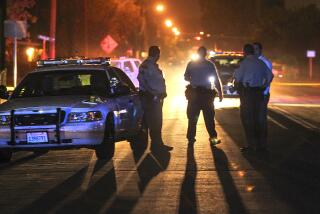A Crime Victim Refuses to Be a Judge
- Share via
She sees them every day in class: teenage boys who so far in life have been defined only by the crimes they’ve committed. But rather than judge or condemn them as lawbreakers, Peggy McIntosh sees them as boys whose lives can be turned around.
Lots of people call that naive. To McIntosh, it’s the only philosophy that makes sense. Besides, she’s seen the results of former gangbangers who get excited about literature and its panoply of tales about character and morality. She teaches 13 students ages 17 to 19 at a county-run school for juvenile offenders.
“I don’t hold it against them,” she says. “In fact, I rarely ever know what crime they’ve done. I just don’t want to know it, because I’m definitely against crimes against people. Subliminally, I know they’ve done horrible things ... but I try to stay away from knowing that, because I like to approach them every single day saying, ‘You’ve got a chance.’ ”
If that makes this child of the ‘60s the quintessential bleeding heart, so be it. But a week ago, McIntosh, 55, had to face the reality of crime.
She returned to her Huntington Beach home in midafternoon to find that it had been burglarized. The burglar took cash, all of her jewelry, several cameras and her passports. She cried in her driveway, both at the loss of prized possessions and because she realized that whoever had caused her such pain had at least a psychic connection with the students she teaches each day -- that is, how many of them had perhaps broken into someone’s home and caused them such anguish?
And while she knew there was no link between the burglary and her students (they have no idea where she lives), the burglary would have been the perfect opportunity for McIntosh to question everything she’s believed. After all, many liberals have changed their tune once they became crime victims.
McIntosh could have done that but didn’t.
Some of her students, who may know more about crime than she does, even asked her why not. “The students say, ‘Miss Mac, you’re still a hippie.’ ”
But one of the reasons she still loves coming to work is that she believes teachers can change lives.
So, naturally, she tried to turn her despair into a lesson.
“I went to school the next day -- I didn’t sleep all night -- and stood in front of the boys and started crying. There was a lesson to be learned, because I think the boys saw so much pain in me, and they have every day since it happened. They’re still saying, ‘How are you doing, are you feeling better, are you OK?’ They’ve seen someone they care about being burglarized. I think that’s character-building for them.”
And how about her? Can she be so charitable toward her students, now that she has been on the other side of a criminal’s actions?
“I’m very aware that people get victimized,” she says. “So, no, I’m not like a person with her head in the clouds. Definitely not. But I believe teachers can make a difference. If teaching isn’t it, where is it? This hasn’t squelched my belief that I can make a difference and that teaching can make a difference.”
McIntosh, who teaches through the county Education Department, says she’ll assign the boys an essay about her break-in. She senses that her situation has had an effect on them, and she wants to see how they articulate it.
I had a question for her, but one of her students had apparently beaten me to it.
“One of the boys -- he has been a gang-involved kid who came in really rough eight weeks ago -- asked me, “Miss Mac, would you forgive this person if they were caught?’ I said yes. That was another huge lesson for them. The boys said they wouldn’t be able to do that. I said, ‘You have to work on that, because you have to be able to forgive people.’ ”
Dana Parsons can be reached at (714) 966-7821, at dana.parsons@latimes.com.
More to Read
Sign up for Essential California
The most important California stories and recommendations in your inbox every morning.
You may occasionally receive promotional content from the Los Angeles Times.










